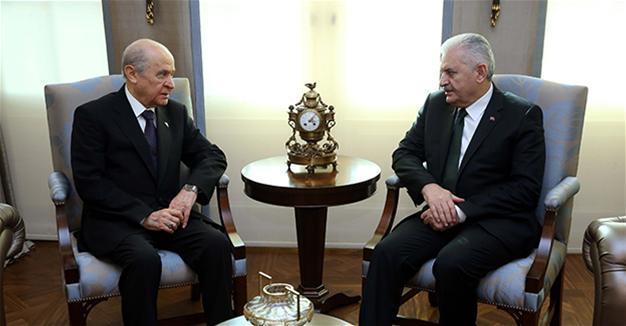PM Yıldırım, MHP head Bahçeli meet ahead of referendum
ANKARA

AA photo
Prime Minister Binali Yıldırım and opposition Nationalist Movement Party (MHP) leader Devlet Bahçeli met in Çankaya Palace in Ankara on Feb. 9 for a 45-minute long meeting held behind doors.
As parties begin to prepare for campaigns for the upcoming contested referendum, Yıldırım and Bahçeli, both who are endorsers of the “yes” vote had led the process for the preparation of an 18-article constitutional amendment.
The meeting came after Bahçeli publicly declared that his party would promote the changes in the constitution, which received soaring backlash from the Republican People’s Party (CHP) who said that it would only bring a one-man regime that would violate the fundamental principles of the separation of powers.
“Today’s meeting was the meeting of two depleted people. One is destroying his authority with one signature, while the other one is destroying a political tradition that he has been in for many years,” Özgür Özel, CHP’s group deputy chairperson, said Feb. 9.
“The meeting may seem like one of two parties who have been in collaboration in the past and will be in partnership in the future. However, they are in such a hurdle that perhaps they could continue their way with a few ministers in order to convince the MHP base,” he said.
“We are not concerned with ministerial negotiations between them. They cannot save themselves from the situation they are in,” he added.
Criticizing the Constitutional Court’s previous ruling on state of emergency decrees, Özel said the government has violated the legal framework for the duration, authority, and coverage of the decree laws.
“These decrees are totally null and void. This is no different than counterfeit. Through [President Recep] Tayyip Erdoğan’s signature and signatures from ministries, democracy and our regime are being defrauded through forgery,” he said.
The Constitutional Court has denied CHP’s appeal on Oct. 12 for the annulment of the decree laws issued by the government on the grounds that it violated the Turkish constitution. The court rejected the appeal as incompetent, stating that the content of the state of emergency rules are outside of the court’s jurisdiction.
